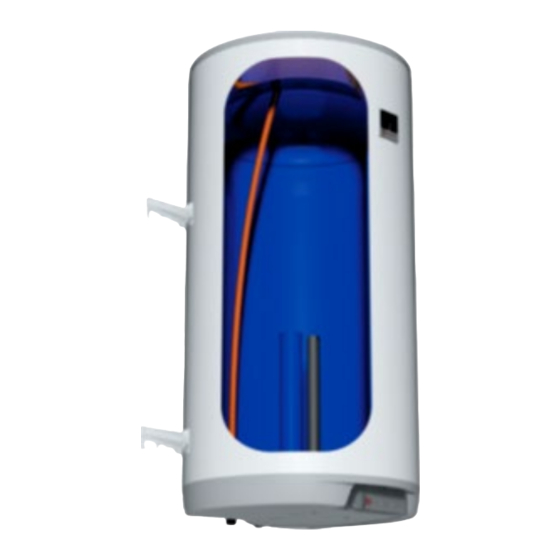Drazice OKHE 100 Kullanım ve Kurulum Kılavuzu - Sayfa 7
Su Isıtıcı Drazice OKHE 100 için çevrimiçi göz atın veya pdf Kullanım ve Kurulum Kılavuzu indirin. Drazice OKHE 100 9 sayfaları. Tank-type water heaters for vertical mounting
Ayrıca Drazice OKHE 100 için: Kullanım ve Kurulum Kılavuzu (19 sayfalar)

6.
First putting into operation
Before opening the power supply, the tank must be filled with water.
During the heating process the pressurised connection water that increases its volume due to heating must
drip off the safety valve, in non-pressurised connection it drips off the overflow combination faucet.
Warning: The process of first heating must be executed by licensed professional who has to check it.
Both the hot water outlet pipe and safety armature parts may be hot.
When heating is finished, the set temperature and the actual temperature of consumed water should be
roughly equal.
After connecting a heater to the water main, hot water heating system, electric network, and after testing its
safety valve (based on the valve manual attached), the heater may be put into operation.
Procedure:
a)
Check both water and electric installation; for combined heaters, check the installation to a hot
water heating system. Check proper placement of operating and safety thermostat sensors. The
sensors must be inserted all the way in; first the operating and then the safety thermostat.
b) Open the hot water valve on the combination faucet;
c) Open the cold water inlet valve to the heater.
d) As soon as the water starts running through the hot water valve, the heater is filled and the valve
closes.
e) In case of a leakage (flange lid), we recommend fastening the flange lid bolts.
f) Fasten the electric installation cover;
g) In case of service water heating by electric energy, turn on the electricity (for combined heaters,
the heating water valve at the heating water entry to heating insert must be closed).
h) When heating service water with electric energy from the hot water heating system, turn the
electricity off and open the valves of heating water input and output, possibly de-aerate the
exchanger.
i) When commencing operation, flush the heater until the cloudiness in the water is gone.
j) Make sure to fill in properly the warranty certificate.
6.1
Putting out of service, discharge
If the hot water heater is put out of service for a longer time, or if it is not going to be used it has to be
drained and disconnected from the electric supply network on all poles. The switch for the supply lead or the
fuse cut-outs have to be shut off.
At places with permanent risk of frost the hot water heater must be drained before the cold season starts if
the appliance remains out of service for several days and unless it is operated in a position protecting from
frost.
Drainage of service water shall be performed after closing the shut-off valve in the cold water supply piping
through the discharge valve for safety valve combination and with simultaneous opening of all hot water
valves of connected fittings. Water can also be drained through the safety valve. To do so, the safety valve
knob shall be turned to the "control" position.
Be careful: Hot water may outflow during the drainage.
If there is a risk of frost it has to be considered that not only the water in the hot water heater and in the hot
water piping may get frozen but also the water in the entire cold water supply piping. It is therefore
advisable to drain all fittings and piping that carry water, up to the part where the house water meter is
installed (connection of the house to water) which is not jeopardised with frost.
When the tank is to be used again, it has to be filled with water and one needs to make sure that the water
flowing out at the hot water valves did not contain any bubbles.
7.
Inspection, maintenance & care for the appliance
During the heating process the water that increases its volume during the heating must drip off the
safety valve outlet (in non-pressurised connection this water drips off the combination faucet valve). In full
o
heating (about 74
C) the volumetric water gain is approx. 3.5% of the tank content. The function of the safety
valve has to be checked regularly. If the safety valve control knob is lifted or turned to the "Control" position,
the water must flow out easily, without any obstacles, from the safety valve element to the outfall line. In
common operation, such a check needs to be implemented at least once a month, and after each heater
shutdown for more than 5 days.
7
